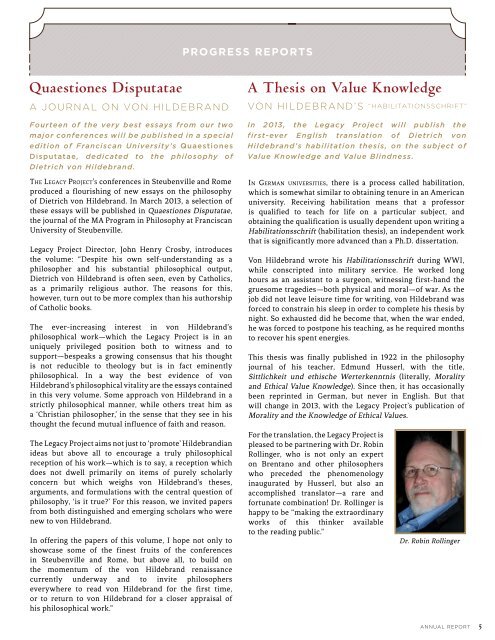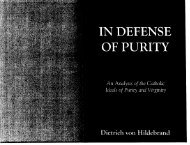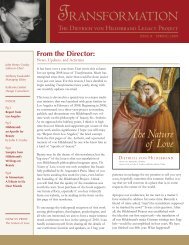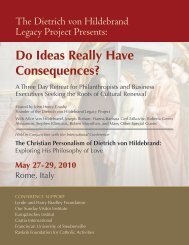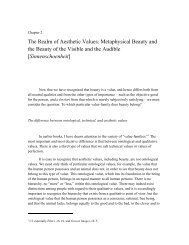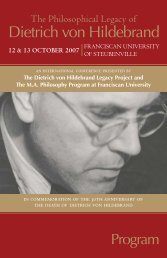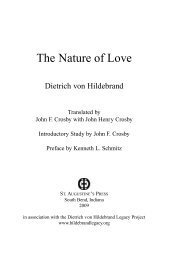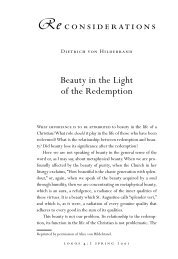The Forgotten Voice of Dietrich von Hildebrand
The Forgotten Voice of Dietrich von Hildebrand
The Forgotten Voice of Dietrich von Hildebrand
You also want an ePaper? Increase the reach of your titles
YUMPU automatically turns print PDFs into web optimized ePapers that Google loves.
PROGRESS REPORTSQuaestiones DisputataeA Journal on <strong>von</strong> <strong>Hildebrand</strong>Fourteen <strong>of</strong> the very best essays from our twomajor conferences will be published in a specialedition <strong>of</strong> Franciscan University’s QuaestionesDisputatae, dedicated to the philosophy <strong>of</strong><strong>Dietrich</strong> <strong>von</strong> <strong>Hildebrand</strong>.<strong>The</strong> Legacy Project’s conferences in Steubenville and Romeproduced a flourishing <strong>of</strong> new essays on the philosophy<strong>of</strong> <strong>Dietrich</strong> <strong>von</strong> <strong>Hildebrand</strong>. In March 2013, a selection <strong>of</strong>these essays will be published in Quaestiones Disputatae,the journal <strong>of</strong> the MA Program in Philosophy at FranciscanUniversity <strong>of</strong> Steubenville.Legacy Project Director, John Henry Crosby, introducesthe volume: “Despite his own self-understanding as aphilosopher and his substantial philosophical output,<strong>Dietrich</strong> <strong>von</strong> <strong>Hildebrand</strong> is <strong>of</strong>ten seen, even by Catholics,as a primarily religious author. <strong>The</strong> reasons for this,however, turn out to be more complex than his authorship<strong>of</strong> Catholic books.<strong>The</strong> ever-increasing interest in <strong>von</strong> <strong>Hildebrand</strong>’sphilosophical work—which the Legacy Project is in anuniquely privileged position both to witness and tosupport—bespeaks a growing consensus that his thoughtis not reducible to theology but is in fact eminentlyphilosophical. In a way the best evidence <strong>of</strong> <strong>von</strong><strong>Hildebrand</strong>’s philosophical vitality are the essays containedin this very volume. Some approach <strong>von</strong> <strong>Hildebrand</strong> in astrictly philosophical manner, while others treat him asa ‘Christian philosopher,’ in the sense that they see in histhought the fecund mutual influence <strong>of</strong> faith and reason.<strong>The</strong> Legacy Project aims not just to ‘promote’ <strong>Hildebrand</strong>ianideas but above all to encourage a truly philosophicalreception <strong>of</strong> his work—which is to say, a reception whichdoes not dwell primarily on items <strong>of</strong> purely scholarlyconcern but which weighs <strong>von</strong> <strong>Hildebrand</strong>’s theses,arguments, and formulations with the central question <strong>of</strong>philosophy, ‘is it true?’ For this reason, we invited papersfrom both distinguished and emerging scholars who werenew to <strong>von</strong> <strong>Hildebrand</strong>.In <strong>of</strong>fering the papers <strong>of</strong> this volume, I hope not only toshowcase some <strong>of</strong> the finest fruits <strong>of</strong> the conferencesin Steubenville and Rome, but above all, to build onthe momentum <strong>of</strong> the <strong>von</strong> <strong>Hildebrand</strong> renaissancecurrently underway and to invite philosopherseverywhere to read <strong>von</strong> <strong>Hildebrand</strong> for the first time,or to return to <strong>von</strong> <strong>Hildebrand</strong> for a closer appraisal <strong>of</strong>his philosophical work.”A <strong>The</strong>sis on Value Knowledge<strong>von</strong> hildebrand’s “habilitationsschrift”In 2013, the Legacy Project will publish thefirst-ever English translation <strong>of</strong> <strong>Dietrich</strong> <strong>von</strong><strong>Hildebrand</strong>’s habilitation thesis, on the subject <strong>of</strong>Value Knowledge and Value Blindness.In German universities, there is a process called habilitation,which is somewhat similar to obtaining tenure in an Americanuniversity. Receiving habilitation means that a pr<strong>of</strong>essoris qualified to teach for life on a particular subject, andobtaining the qualification is usually dependent upon writing aHabilitationsschrift (habilitation thesis), an independent workthat is significantly more advanced than a Ph.D. dissertation.Von <strong>Hildebrand</strong> wrote his Habilitationsschrift during WWI,while conscripted into military service. He worked longhours as an assistant to a surgeon, witnessing first-hand thegruesome tragedies—both physical and moral—<strong>of</strong> war. As thejob did not leave leisure time for writing, <strong>von</strong> <strong>Hildebrand</strong> wasforced to constrain his sleep in order to complete his thesis bynight. So exhausted did he become that, when the war ended,he was forced to postpone his teaching, as he required monthsto recover his spent energies.This thesis was finally published in 1922 in the philosophyjournal <strong>of</strong> his teacher, Edmund Husserl, with the title,Sittlichkeit und ethische Werterkenntnis (literally, Moralityand Ethical Value Knowledge). Since then, it has occasionallybeen reprinted in German, but never in English. But thatwill change in 2013, with the Legacy Project’s publication <strong>of</strong>Morality and the Knowledge <strong>of</strong> Ethical Values.For the translation, the Legacy Project ispleased to be partnering with Dr. RobinRollinger, who is not only an experton Brentano and other philosopherswho preceded the phenomenologyinaugurated by Husserl, but also anaccomplished translator—a rare andfortunate combination! Dr. Rollinger ishappy to be “making the extraordinaryworks <strong>of</strong> this thinker availableto the reading public.”Dr. Robin RollingerANNUAL REPORT5


